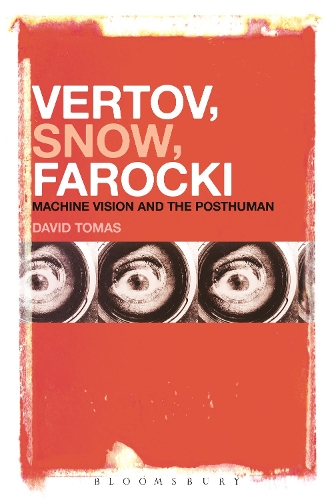
Vertov, Snow, Farocki: Machine Vision and the Posthuman
(Paperback)
Available Formats
Publishing Details
Vertov, Snow, Farocki: Machine Vision and the Posthuman
By (Author) David Tomas
Bloomsbury Publishing PLC
Bloomsbury Academic USA
23rd April 2015
United States
Classifications
Professional and Scholarly
Non Fiction
791.4372
Physical Properties
Paperback
304
Width 152mm, Height 229mm
408g
Description
Vertov, Snow, Farocki: Machine Vision and the Posthuman begins with a comprehensive and original anthropological analysis of Vertov's film The Man With a Movie Camera. Tomas then explores the film's various aspects and contributions to media history and practice through detailed discussions of selected case studies. The first concerns the way Snow's La Rgion Centrale and De La extend and/or develop important theoretical and technical aspects of Vertov's original film, in particular those aspects that have made the film so important in the history of cinema. The linkage between Vertov's film and the works discussed in the case studies also serve to illustrate the historical and theoretical significance of a comparative approach of this kind, and illustrate the pertinence of adopting a 'relational approach' to the history of media and its contemporary practice, an approach that is no longer focused exclusively on the technical question of the new in contemporary media practices but, in contrast, situates a work and measures its originality in historical, intermedia, and ultimately political terms.
Reviews
Tomas' ideas are fascinating . . . [and his book] presents these ideas in a measured way, precisely and deliberately considering his key examples. The volume is a must for anyone interested in technology or cinema, or for the greater implications of a society who carries in their pocket the capacity to record and represent the world around them. -- Daniel Binns, University of West Sydney, Australia * Cinema Journal *
Tomas, an artist and anthropologist at the Universit du Qubec, Montral, continues the work he undertook in Beyond the Image Machine: A History of Visual Technologies, exhorting readers to view visual technologies differently. In this volume, Tomas attempts to shift attention from aesthetic products to ritual practices. Specifically, he argues for understanding the mechanical process of filming as a rite of passage whereby the image is taken, processed, and reincorporated into the socio-symbolic order. This ritual structure becomes the basis for a comparative anthropological study of Dziga Vertovs The Man with a Movie Camera, Michael Snows La Rgion Centrale and De La, and Harun Farockis trilogy Eye/Machine and Counter-Music. The experimental, posthuman processes involved in shooting these unique films is of primary interest, leading to detailed discussions of the filmmakers intentions and abstract theorization of their specific execution. For this reason, Tomass esoteric, though intriguing, revisioning of films history and future is likely of most use to experts. Summing Up: Recommended. Graduate students, researchers, faculty. -- T. J. Welsh, Loyola University New Orleans, USA * CHOICE *
Author Bio
David Tomas is a Professor at the School of Visual Arts, University of Quebec, Montreal, Canada.
